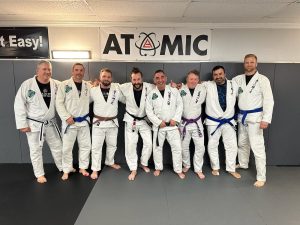
Why Police Officers Should Train Jiu Jitsu
Written by Adrian J Trevino
Jiu-Jitsu for Law Enforcement
In recent years, there has been an increasing recognition of the benefits of Brazilian Jiu Jitsu (BJJ) for law enforcement officers (LEOs) and their Departments. Here’s why BJJ, and its adapted form for police known as Police Jiu Jitsu (PJJ), is considered beneficial for officers:
- Control and Restraint: BJJ emphasizes techniques for gaining control over an opponent without necessarily causing serious harm. This is crucial for LEOs who often need to subdue suspects while minimizing the risk of injury to both parties.
- Escalation and De-escalation: BJJ provides officers with a range of options for escalating or de-escalating force depending on the situation. Officers trained in BJJ are better equipped to handle confrontations in a measured and proportionate manner, potentially reducing the need for excessive force.
- Safety: By learning how to control opponents on the ground, LEOs can enhance their safety during physical altercations. BJJ techniques enable officers to neutralize threats and maintain a safer distance from suspects, reducing the likelihood of injury.
- Skill Development: BJJ training enhances officers’ physical fitness, agility, and coordination, all of which are essential for performing their duties effectively. Additionally, mastering BJJ techniques requires mental discipline and problem-solving skills, which can benefit officers in high-pressure situations.
- Adaptability: BJJ techniques can be adapted to suit the specific needs and challenges faced by LEOs. PJJ, in particular, focuses on practical applications of BJJ for law enforcement scenarios, incorporating techniques that are relevant to policing duties.
- Community Relations: Training in BJJ can also have positive implications for community relations. By demonstrating proficiency in non-lethal tactics and restraint, officers can build trust and credibility within the communities they serve.
It’s important to emphasize that while BJJ can be a valuable component of defensive tactics training for LEOs, it should be integrated as part of a comprehensive training program that includes other relevant skills such as communication, conflict resolution, and firearm proficiency. Additionally, ongoing training and reinforcement are essential to ensure that officers maintain their skills and remain effective in real-world situations.
Please let me know your thoughts. I am extremely interested in your opinions. ..

